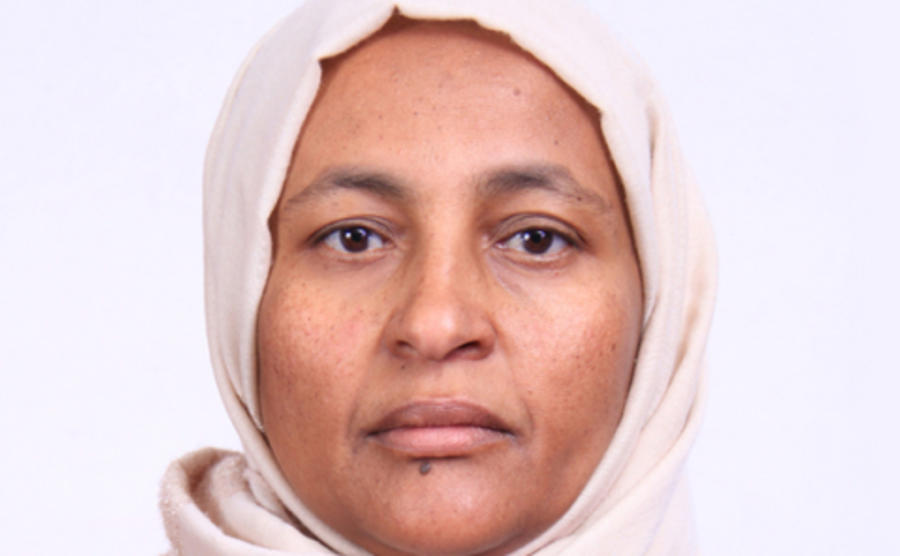Type de contenu
Professeur invitéMuna Abubeker Ibrahim
| Élément joint | Taille |
|---|---|
| Abubeker_Affiche.pdf | 449.67 Ko |

Muna Abubeker travaille en tant qu’historienne sur les corpus d’archives des XIXe et XXe siècles de la ville musulmane de Harrar, en Éthiopie, composés de documents juridiques et notariaux rédigés en arabe mâtinée d’expressions harari, la langue de la ville. Lors de son master, soutenu en 2007 à l’université d’Addis Abeba, elle avait analysé suivant un prisme genré ces documents donnant à voir de façon singulière la grande capacité d’agir des femmes, notamment en tant que propriétaires foncières et gérantes de commerces. Sa thèse soutenue en 2017, exploite l’un des recueils de la cour de justice harari couvrant la période 1827-37, composé de près de 2000 documents. Ils permettent de comprendre les relations sociales et les liens économiques dans la ville de Harrar et avec son arrière pays, avant la mise sous tutelle de la région par l’Égypte en 1875. Elle s’intéresse par ailleurs à la documentation ajami, de langue harari.
Muna Abubeker Ibrahim participe au Programme Professeurs invités de l’EHESS sur proposition d’Anaïs Wion (IMAF) dans le cadre de la chaire sécable de l’IISMM.
CONFERENCES
Ajami Literature Practice in Harari Language
Ajami literature has been written in Harari using Arabic script. So far the Kitab al Faraid is the oldest known ajami manuscript of Ethiopia and is estimated to the 17th century. It is a unique witness of ancient Harari language. Ajami Harari documents are still produced today, especially for zikri, religious chants sung at Mawlid, mourning, wedding ceremonies and other gatherings among the community members. In this seminar, Harari ajami literature and songs composed by contemporary poets will be presented and compared to the previous practices, both linguistically and culturally.
Dans le cadre du séminaire “Monuments et Documents de l’Afrique ancienne : recherches en cours en histoire, histoire de l’art et archéologie”, organisé par Anaïs Wion (IMAF, CNRS), Marie-Laure Derat (O&M, CNRS), Claire Bosc-Tiessé (INHA, CNRS), Amélie Checkroun (IREMAM, CNRS)
Mercredi 10 mai 2023 de 9h30 à 12h30 – Salle Walter Benjamin, INHA, galerie Vivienne, paris 4
Slavery in the 19th century Harari Court Document
A 19th century court archives of Harar that registered different cases of marriage, inheritance, divorce, land transaction and other matters from 1827 to 1837 mentions 58 slaves and 157 ex-slaves out of a total of 2197 cases. The court cases were recorded on a daily bases by the qadi Abdurahman Muhammad who was appointed by the ruler of the city state, Harar. These cases will be discussed in the light of the legal practice of slavery in the Harari court, which was a sharia based court. Matters including acquisition, treatment and manumission of slaves will be discussed along with the prospects of ex-slaves.
Dans le cadre du séminaire “Anthropologie comparative des sociétés et cultures musulmanes” co-organisé par Yazid Ben Hounet (CNRS, LAS) et Barbara Casciarri (Université Paris 8 Vincennes-Saint Denis, Université Paris Cité)
- Mardi 16 mai 2023 de 15h à 19h – Collège de France, 11 place Marcelin-Berthelot 75005 Paris
Mid-19th c. divorce Cases in Harar (Ethiopia): legal and social roles of the qadi, the ruler of the city, the elders, and women agentivity
Qadi Abdurahman Omar of Harar Ethiopian city state stayed in office from 1837 to 1867, and produced two archival files record. His registrations include marriage, inheritance, divorce, land transactions and other matters. This study will focus on a corpus of 168 divorce cases (already transcribed and translated). The discussion will include the Islamic jurisprudence school of law the qadi employed. Also, the respective roles of the qadi, the ruler of the city state and of the elders will be examined. Women as agents and their roles in the divorce process as reflected from the court documents will ultimately be discussed.
Dans le cadre du séminaire “Anthropologie Historique des spécialistes du religieux: genre et pouvoir dans les mondes musulmans” co-organisé par Tiziana Leucci (CNRS, CEIAS) et Alessandra Fiorentini (contrat postdoctoral, EHESS)
- Mercredi 17 mai 2023 de 16h30 à 18h30 – Salle 3.10, Campus Condorcet, Centre de colloques, Cours des humanités 93300 Aubervilliers
Women in early 19th c. Harari court documents
Harar is a muslim city-state of Eastern Ethiopia, famous for its very specific urban culture. 19th c. sharia court documents of Harar registered marriage, inheritance, divorce, land transaction and other cases. The registration was conducted by qadi (judge) Abdurahman Muhammad for ten years from 1827 to 1837. Document are written in Arabic language, the scholarly language of Harar. Women were mentioned in all the cases. This study will investigate the status of women in the legal as well as the economic life of the city state. The study will examine the cases in the light of the Islamic sharia towards women.
Dans le cadre du séminaire EHESS “Dynamiques du genre en Afrique”, organisé par Anne Hugon (Université Paris 1 Panthéon-Sorbonne, IMAF) et Marianne Lemaire (CNRS, IMAF)
- Jeudi 25 mai 2023 de 8h30-10h30 – Salle 25-B, Bâtiment EHESS, Campus Condorcet, 2 cours des humanités 93300 Aubervilliers
